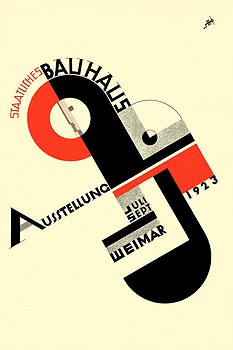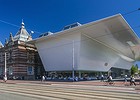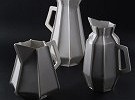Critique in Complacent Isolation
Jan van Eyck vs. Bauhaus
The director of the Jan van Eyck Academy in Maastricht, Hicham Khalidi, supported by a throng of high-profile European artists, designers, curators and educators, issued a letter of protest against the use of the word “Bauhaus” in the proposed title for a cultural foundation under the new European Green Deal: The New European Bauhaus.
Illsutration: Joost Schmidt, poster for Bauhaus exhibition, 1923
I wonder: which sin has this word committed that makes it unworthy of such a magnificent plan, which my friends in the art and design world warmly embrace in every other respect?
Khalidi and his colleagues state that the word “Bauhaus” is “inherently not inclusive.” This, according to the author, is because “the Bauhaus is perceived as the epitome of Modernism, and a critical reading of Modernity inevitably ties it to a past of colonial extractivism and a future of industrial capitalism.” Therefore, he continues, “we feel that this title deals uncritically with such history, and falls short in acknowledging the multiple histories that Europe is made of.”
Now here I must protest, as an art historian, design critic and educator, and as a citizen of this diverse world of ours. Although multifaceted, the link between Bauhaus and Modernism is clear and, clearly, the EU committee wanted to refer to this ideology when titling their plan. Now one may critique Modernism and its reception, even by projecting today’s norms onto social, political and cultural realities of well over a century ago, but to state that such critical analysis “inevitably” leads to certain conclusions is, in my view, not only a-historical, but also inherently uncritical.
With his focus on the pre-WW1 European roots and post-WW2 effects of “Modernity” in general, Khalidi’s argumentation almost makes one forget that Walter Gropius in his 1919 Bauhaus Manifesto condemned the “complacent isolation” in which the arts had maneuvered themselves at the time. Gropius’ exalted plea for inclusion (of artists and craftsmen of all disciplines – the focus of his address), “free of divisive class pretensions,” can in my view still serve as inspiration, as it clearly did for the EU committee.
I admit to quoting as selectively here as my esteemed colleagues did in their letter of protest. But I’d shy away from any conclusion that would be “inevitable” in this context. Let’s not say that a critical look at Jan van Eyck, this epitome of early modernity in painting, inevitably leads to the conclusion that, as a secret envoy of autocratic rulers of his time, his name cannot be used for an art institution that criticizes autocratic leadership today. Let’s not say that a critical reading of Willem de Kooning’s portrayal of female flesh should inevitably lead to erasing his name from the title of a high-profile art school that today adamantly condemns misogyny. Let’s not say that a critical reading of Saint Luke inevitably ties the apostle to two millennia of abuse, racism, bigotry and child molestation world-wide, and that therefore using his name in art schools in general sends a wrong signal. Let’s not overinterpret a partisan scrutiny of histories.
My friends in the arts, who signed the letter of protest against the reference to Bauhaus in the EU plan: a good part of you are working for and within institutions with names as the ones mentioned above. Institutions and names, which are inextricably (yes, that word I think I can use) tied to problematic histories. One could hold that history is problematic by nature. So let’s critically read history – but let’s not try and erase any reference to selectively pigeonholed interpretations of it. In this case, rather than being confronted with “inevitable” conclusions, I would have liked to read a sound argumentation of why the reference to Modernism should “inevitably” be interpreted as a sign that the cultural new green deal is compromised right from its start. That the reference to Bauhaus “inevitably” shows that neo-colonial tendencies and industrial capitalist interests are embedded within the very plan that purports to fight the damage these interests have caused.
With a bit more nuance and a lot less complacency, a critical reading of history may become productive again and will, to quote Bauhaus founder Gropius once more, “one day rise heavenwards from the million hands of craftsmen as a clear symbol of a new belief to come.”
... reageer










Wil je reageren op dit artikel? Stuur een mailtje naar de redactie.